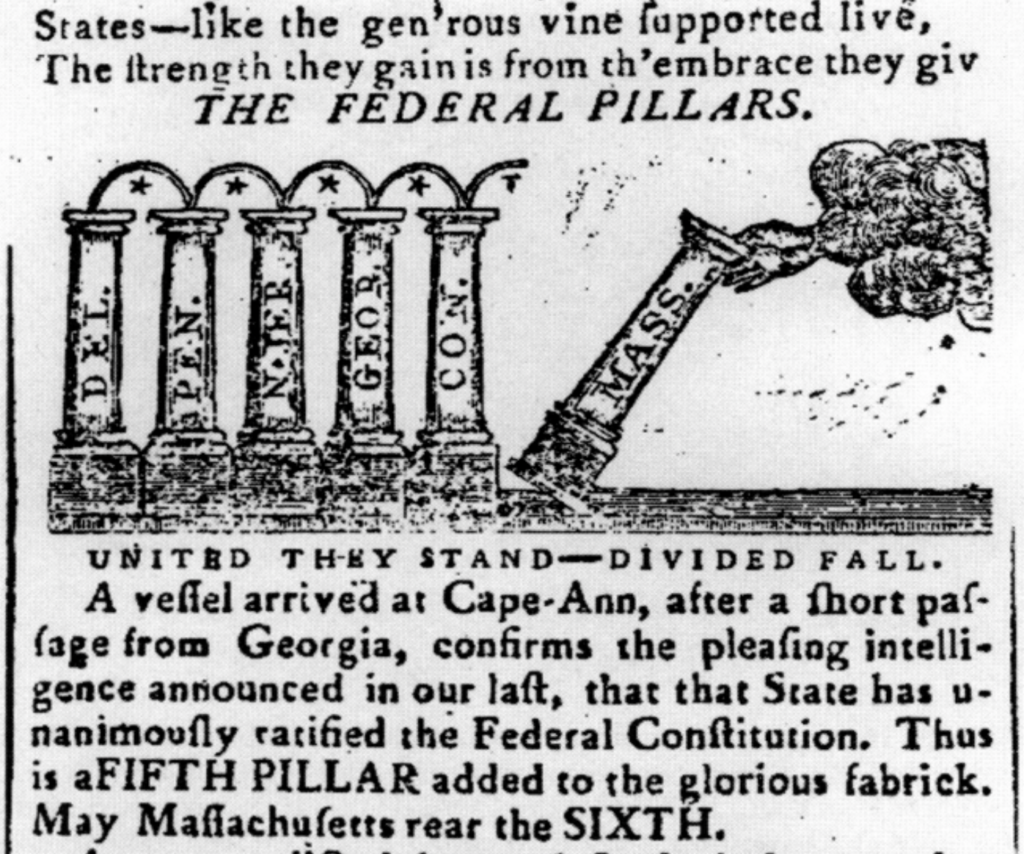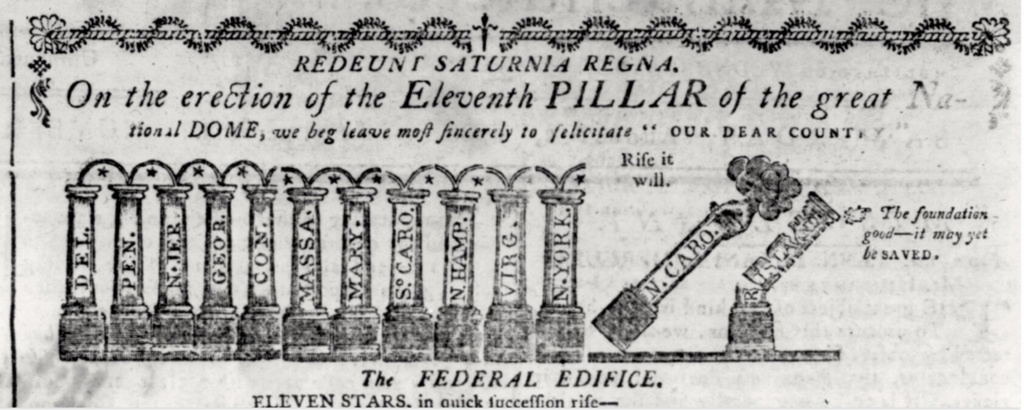As a remedy for the democratic ills of the 1780s, [the Constitution] fell short of the mark. Still, it was better than the Articles of Confederation, and Madison and Hamilton began working for its ratification by the states. Together with John Jay, they wrote under the pseudonym “Publius” eighty-five papers, published initially in newspaper between October 1787 and the summer of 1788 and later collected in book form as THE FEDERALIST. The essays were designed principally to convince New Yorkers to ratify the new document. Precisely because the issue of the Constitution’s republican character seemed so much in doubt, the authors spent a considerable amount of time describing just how republican the new government was. In the Constitution, wrote Madison in Federalist No. 10, ‘we behold a republican remedy for the diseases most incident to republicanism.’ –Gordon Wood, Power and Liberty, pp. 86-87
Ratification Timeline (CSAC / U Wisconsin)
| State | Convention | Vote on Ratification | Vote | Map | Introduction |
|---|---|---|---|---|---|
| Delaware | 3–7 December 1787 | 7 December 1787 | 30-0 | Map | Essay |
| Pennsylvania | 20 November–15 December 1787 | 12 December 1787 | 46-23 | Map | Essay |
| New Jersey | 11–20 December 1787 | 18 December 1787 | 38-0 | Map | Essay |
| Georgia | 25 December 1787–5 January 1788 | 31 December 1787 | 26-0 | Map | Essay |
| Connecticut | 3–9 January 1788 | 9 January 1788 | 128-40 | Map | Essay |
| Massachusetts | 9 January–7 February 1788 | 6 February 1788 | 187-168 | Map | Essay |
| Maryland | 21–29 April 1788 | 26 April 1788 | 63-11 | Map | Essay |
| South Carolina | 12–24 May 1788 | 23 May 1788 | 149-73 | Map | Essay |
| New Hampshire | 13–22 February 1788 (1st session) 18–21 June 1788 (2nd session) |
21 June 1788 | 57-47 | Map | Essay |
| Virginia | 2–27 June 1788 | 25 June 1788 | 89-79 | Map | Essay |
| New York | 17 June–26 July 1788 | 26 July 1788 | 30-27 | Map | Essay |
| North Carolina | 21 July–4 August 1788 (1st convention) 16–23 November 1789 (2nd convention) |
2 August 1788 21 November 1789 |
75-193 194-77 |
Maps | Essay |
| Rhode Island | 1–6 March 1790 (1st session) 24–29 May 1790 (2nd session) |
29 May 1790 | 34-32 | Map | Essay |
| Vermont | 6-10 January 1791 | 10 January 1791 | 105-4 | Map | Essay |
Federalist No. 10 (Madison // Nov. 23, 1787)
Liberty is to faction what air is to fire, an aliment without which it instantly expires. But it could not be less folly to abolish liberty, which is essential to political life, because it nourishes faction, than it would be to wish the annihilation of air, which is essential to animal life, because it imparts to fire its destructive agency.
The latent causes of faction are thus sown in the nature of man; and we see them everywhere brought into different degrees of activity, according to the different circumstances of civil society. A zeal for different opinions concerning religion, concerning government, and many other points, as well of speculation as of practice; an attachment to different leaders ambitiously contending for pre-eminence and power; or to persons of other descriptions whose fortunes have been interesting to the human passions, have, in turn, divided mankind into parties, inflamed them with mutual animosity, and rendered them much more disposed to vex and oppress each other than to co-operate for their common good.
The smaller the society, the fewer probably will be the distinct parties and interests composing it; the fewer the distinct parties and interests, the more frequently will a majority be found of the same party; and the smaller the number of individuals composing a majority, and the smaller the compass within which they are placed, the more easily will they concert and execute their plans of oppression. Extend the sphere, and you take in a greater variety of parties and interests; you make it less probable that a majority of the whole will have a common motive to invade the rights of other citizens; or if such a common motive exists, it will be more difficult for all who feel it to discover their own strength, and to act in unison with each other.
Federalist No. 68 (Hamilton // March 14, 1788)
THE mode of appointment of the Chief Magistrate of the United States is almost the only part of the system, of any consequence, which has escaped without severe censure, or which has received the slightest mark of approbation from its opponents.
They have not made the appointment of the President to depend on any preexisting bodies of men, who might be tampered with beforehand to prostitute their votes; but they have referred it in the first instance to an immediate act of the people of America, to be exerted in the choice of persons for the temporary and sole purpose of making the appointment. And they have excluded from eligibility to this trust, all those who from situation might be suspected of too great devotion to the President in office. No senator, representative, or other person holding a place of trust or profit under the United States, can be of the numbers of the electors.
The process of election affords a moral certainty, that the office of President will never fall to the lot of any man who is not in an eminent degree endowed with the requisite qualifications. Talents for low intrigue, and the little arts of popularity, may alone suffice to elevate a man to the first honors in a single State; but it will require other talents, and a different kind of merit, to establish him in the esteem and confidence of the whole Union, or of so considerable a portion of it as would be necessary to make him a successful candidate for the distinguished office of President of the United States. It will not be too strong to say, that there will be a constant probability of seeing the station filled by characters pre-eminent for ability and virtue.
Federalist No. 78 (Hamilton // May 27, 1788)
According to the plan of the convention, all judges who may be appointed by the United States are to hold their offices DURING GOOD BEHAVIOR; which is conformable to the most approved of the State constitutions and among the rest, to that of this State. Its propriety having been drawn into question by the adversaries of that plan, is no light symptom of the rage for objection, which disorders their imaginations and judgments. The standard of good behavior for the continuance in office of the judicial magistracy, is certainly one of the most valuable of the modern improvements in the practice of government. In a monarchy it is an excellent barrier to the despotism of the prince; in a republic it is a no less excellent barrier to the encroachments and oppressions of the representative body. And it is the best expedient which can be devised in any government, to secure a steady, upright, and impartial administration of the laws.
There is no position which depends on clearer principles, than that every act of a delegated authority, contrary to the tenor of the commission under which it is exercised, is void. No legislative act, therefore, contrary to the Constitution, can be valid. To deny this, would be to affirm, that the deputy is greater than his principal; that the servant is above his master; that the representatives of the people are superior to the people themselves; that men acting by virtue of powers, may do not only what their powers do not authorize, but what they forbid. If it be said that the legislative body are themselves the constitutional judges of their own powers, and that the construction they put upon them is conclusive upon the other departments, it may be answered, that this cannot be the natural presumption, where it is not to be collected from any particular provisions in the Constitution. It is not otherwise to be supposed, that the Constitution could intend to enable the representatives of the people to substitute their WILL to that of their constituents. It is far more rational to suppose, that the courts were designed to be an intermediate body between the people and the legislature, in order, among other things, to keep the latter within the limits assigned to their authority. The interpretation of the laws is the proper and peculiar province of the courts. A constitution is, in fact, and must be regarded by the judges, as a fundamental law. It therefore belongs to them to ascertain its meaning, as well as the meaning of any particular act proceeding from the legislative body.


